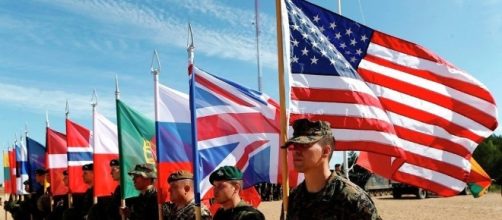The NATO summit, held in Warsaw, Poland from the 8th to the 9th July, marked the beginning of greater cooperation with the EU. As the summit declared that there is ‘an arc of insecurity and instability along NATO’s periphery’, it also included the first joint NATO-EU declaration. NATO leaders announced the placement of four battalions in Poland, Estonia, Latvia and Lithuania, as they ‘decided to strengthen the alliance’s military presence in the East’, which comes after Putin’s increasing demonstration of expansionist interests. President Obama himself announced the deployment of 1,000 more US troops to Poland, as he stated that the decisions made in Warsaw were ‘the most significant reinforcement of collective defense any time since the Cold War’.
However one issue that garnered little attention at the summit was that of Brexit, and how this would surely affect the North Atlantic Treaty Organisation.
'One of NATO's most capable members'
President Obama has stated that he has ‘no doubt that the UK wil remain one of NATO’s most capable members’, as the then-Prime Minister David Cameron pledged to send 500 British soldiers to Estonia. Indeed, Andrzej Duda, the Polish president, stated that ‘the EU and NATO and quite separate organisations’; although British involvement in the EU is likely to be severely diminished, this does not mean the same must happen to their involvement in NATO. This view was reinforced by NATO secretary-general Jens Stoltenberg, who said that Brexit will not affect the strength of the alliance.
As the most pro-NATO EU member, Britain has traditionally been a bridge between the two organisations, as well as one of NATO’s biggest financial contributors. However, Brexit has put this position in jeopardy; with severe negative economic consequences predicted for Britain leaving the EU, military spending would be a ‘soft target’ for Chancellor of the Exchequer Phillip Hammond if and when further budget cuts became necessary. Brexit therefore means that there may well be a need for European members of the organisation to make greater contributions, namely by putting more forces in the field.
Trump's dangerous talk
President of the European Council Donald Tusk has also said that the geo-political consequences of Brexit ‘may be very serious’, and Krzysztof Blusz, vice-president of WiseEuropa, a think-tank, predicts that Brexit will lead to NATO member states becoming more inward-looking, which can be taken advantage of by the Kremlin.
The potential for a reduced British role in NATO would inevitably pressure the US to increase their own involvement. However, Republican presidential nominee Donald Trump stated in a recent interview that he would not necessarily defend the US’s NATO allies if they were attacked by a foreign power. He further stated that he would only defend those who he deemed to have contributed enough money to the alliance; this contradicts Article 5 of the North Atlantic Treaty which established NATO, and perhaps puts the US’s role in NATO in the future into question as well.

